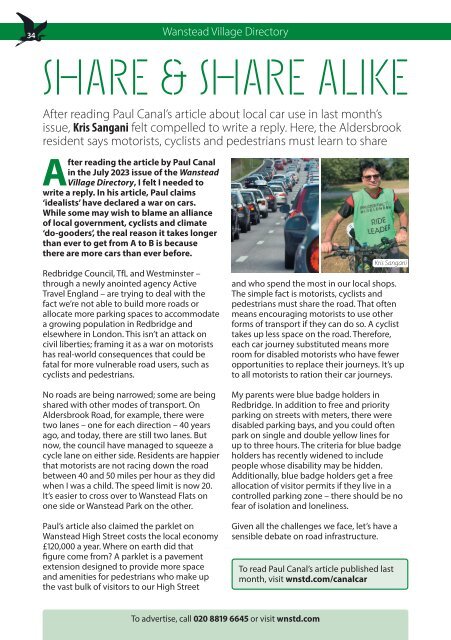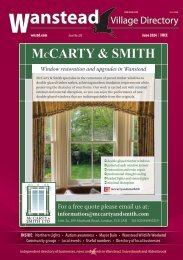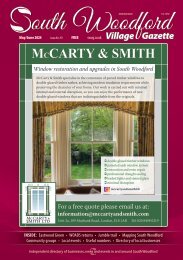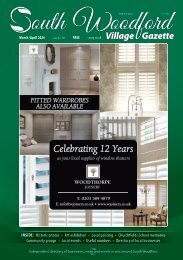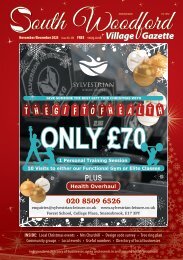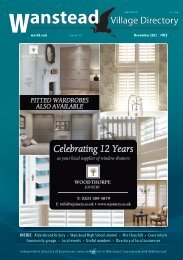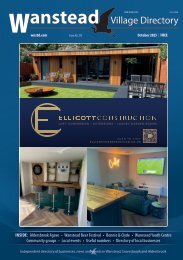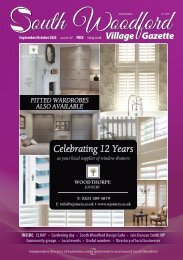August 2023
Create successful ePaper yourself
Turn your PDF publications into a flip-book with our unique Google optimized e-Paper software.
34<br />
Wanstead Village Directory<br />
share & share alike<br />
After reading Paul Canal’s article about local car use in last month’s<br />
issue, Kris Sangani felt compelled to write a reply. Here, the Aldersbrook<br />
resident says motorists, cyclists and pedestrians must learn to share<br />
After reading the article by Paul Canal<br />
in the July <strong>2023</strong> issue of the Wanstead<br />
Village Directory, I felt I needed to<br />
write a reply. In his article, Paul claims<br />
‘idealists’ have declared a war on cars.<br />
While some may wish to blame an alliance<br />
of local government, cyclists and climate<br />
‘do-gooders’, the real reason it takes longer<br />
than ever to get from A to B is because<br />
there are more cars than ever before.<br />
Redbridge Council, TfL and Westminster –<br />
through a newly anointed agency Active<br />
Travel England – are trying to deal with the<br />
fact we’re not able to build more roads or<br />
allocate more parking spaces to accommodate<br />
a growing population in Redbridge and<br />
elsewhere in London. This isn’t an attack on<br />
civil liberties; framing it as a war on motorists<br />
has real-world consequences that could be<br />
fatal for more vulnerable road users, such as<br />
cyclists and pedestrians.<br />
No roads are being narrowed; some are being<br />
shared with other modes of transport. On<br />
Aldersbrook Road, for example, there were<br />
two lanes – one for each direction – 40 years<br />
ago, and today, there are still two lanes. But<br />
now, the council have managed to squeeze a<br />
cycle lane on either side. Residents are happier<br />
that motorists are not racing down the road<br />
between 40 and 50 miles per hour as they did<br />
when I was a child. The speed limit is now 20.<br />
It’s easier to cross over to Wanstead Flats on<br />
one side or Wanstead Park on the other.<br />
Paul’s article also claimed the parklet on<br />
Wanstead High Street costs the local economy<br />
£120,000 a year. Where on earth did that<br />
figure come from? A parklet is a pavement<br />
extension designed to provide more space<br />
and amenities for pedestrians who make up<br />
the vast bulk of visitors to our High Street<br />
Kris Sangani<br />
and who spend the most in our local shops.<br />
The simple fact is motorists, cyclists and<br />
pedestrians must share the road. That often<br />
means encouraging motorists to use other<br />
forms of transport if they can do so. A cyclist<br />
takes up less space on the road. Therefore,<br />
each car journey substituted means more<br />
room for disabled motorists who have fewer<br />
opportunities to replace their journeys. It’s up<br />
to all motorists to ration their car journeys.<br />
My parents were blue badge holders in<br />
Redbridge. In addition to free and priority<br />
parking on streets with meters, there were<br />
disabled parking bays, and you could often<br />
park on single and double yellow lines for<br />
up to three hours. The criteria for blue badge<br />
holders has recently widened to include<br />
people whose disability may be hidden.<br />
Additionally, blue badge holders get a free<br />
allocation of visitor permits if they live in a<br />
controlled parking zone – there should be no<br />
fear of isolation and loneliness.<br />
Given all the challenges we face, let’s have a<br />
sensible debate on road infrastructure.<br />
To read Paul Canal’s article published last<br />
month, visit wnstd.com/canalcar<br />
To advertise, call 020 8819 6645 or visit wnstd.com


